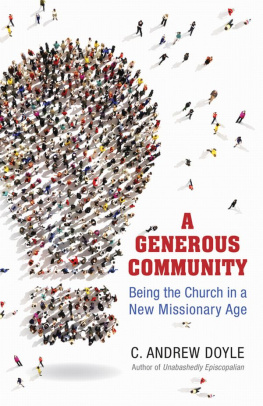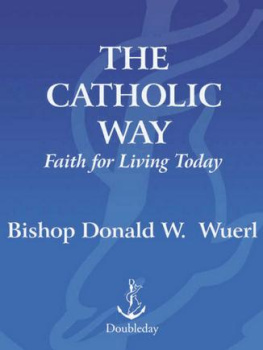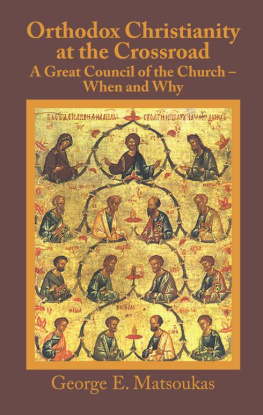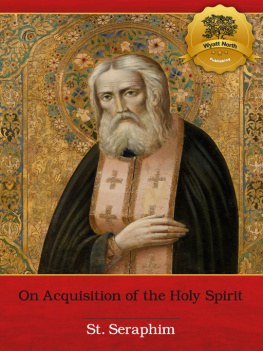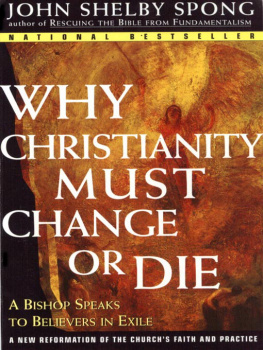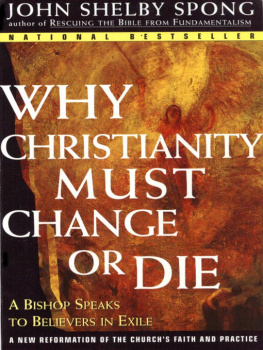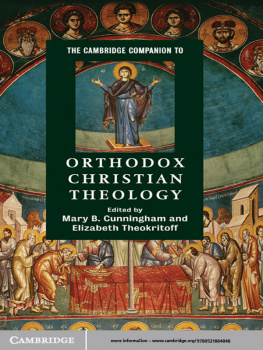a life together
a life together
Wisdom of Community from
the Christian East
BISHOP SERAPHIM SIGRIST

A Life Together: Wisdom of Community from the Christian East
2011 First Printing
Copyright 2011 Bishop Seraphim Sigrist
ISBN: 978-1-55725-800-7
Scripture references marked KJV are from the Authorized King James Version of the Holy Bible.
Scripture references marked RSV are from the Revised Standard Version of the Bible, copyright 1946, 1952, and 1971 by the Division of Christian Education of the National Council of the Churches of Christ in the United States of America. Used by permission. All rights reserved.
Library of Congress Cataloging-in-Publication Data
Sigrist, Seraphim.
A life together : wisdom of community from the Christian East / by Seraphim Sigrist.
p. cm.
Includes bibliographical references.
ISBN 9781557258007
1. ChurchMeditations. 2. CommunitiesReligious aspects
ChristianityMeditations. I. Title.
BV600.3.S55 20110
262.019--dc22
2010051153
10 9 8 7 6 5 4 3 2 1
All rights reserved. No part of this book may be reproduced, stored in an electronic retrieval system, or transmitted in any form or by any meanselectronic, mechanical, photocopy, recording, or any otherexcept for brief quotations in printed reviews, without the prior permission of the publisher.
Published by Paraclete Press
Brewster, Massachusetts
www.paracletepress.com
Printed in the United States of America
Contents
biographical notes and
suggestions for further reading
preface
To discover the church is to discover community.
This can be disquieting and unexpected for a new Christian. So C. S. Lewiss diabolical tempter Screwtape writes that when he gets to his pew and looks around him he sees just that selection of his neighbors whom he has hitherto avoided. From this can come the more or less unconscious feeling that he is showing great humility and condescension in going to church with these smug commonplace neighbors at all.
Of course, as Screwtape notes, this feeling involves the subconscious illusions that these neighbors are insignificant in Gods eyes, and also that somehow since they are not wearing togas they are not of the same family as the Christians of the New Testament time were.
Community entered into in this illusory wayas mere church activity, or as judgmentwill at most create segmentation of ones life: hearty and perfunctory greetings on Sunday and perhaps an occasional committee meeting or parish outing. So then a faith that began so brightly becomes but the spiritual compartment of a life with many other compartments scarcely related to it at all.
The systematic effort to destroy religious faith that was so central to the communist regime in Russia was many sided. It included the closing of churches, the harassment of believers, the inculcation of atheism through the schools, and also one more insidious dimension that was beyond the possibility or imagination of the Roman persecutor in the days of the early martyrsthe limitation of church activity, in those churches allowed to remain open for the time, to the formal and ritualistic. No meetings to study and discuss the Bible. No Sunday schools. No prayer circles. Not even the tea or coffee after liturgy or the parish picnic, which are the sort of minimums of the American church community.
In this the enemies of Christianity showed a realization like that of Screwtapesthat in attacking the possibility of community, they strike at the core of what Christianity is. Yet, as again and again before in history when the church is attacked or in decline, it manifests a power of resurrection. As the Russian priest, and leader of Christian renewal, Fr. Alexander Men said:
Christianity is the religion of death, instantly transformed into life.... They counted us as dead, but lo we are alive. These words spoken by the Apostle Paul have resonated for all time. Throughout the Churchs history there were incredible disappointments and it often seemed that she was crushed, but by the power of God she resurrected as many times...
Fr. Men said this in response to a question at an impromptu meeting around a table in a home where people had gathered to meet him. These meetings were themselves a resurrection of that principle of community that the enemies of faith had so assiduously sought to destroy.
Mark Weiner, who had been baptized by Fr. Men, was one of those who made his home available for these dangerous but vital meetings and he summarizes the situation of the time well:
From the beginning of the 1980s, the KGB pressures on Fr. Mens parish in Novoderevnya intensified. Frequently he was called in for interrogation and warnings. There were interrogations and arrests of parishioners. Even the briefest opportunities for meeting with his spiritual children in the tiny office of the pastor, in the little house by the church, were forbidden. Thus the talks about Christ, the church, the Bible, and life and death moved to private homes and kitchens.
The form of the parishs infrastructure was the gatherings. This is how we referred to the groups of Fr. Mens parishioners (mostly young people) who met weekly in private homes for communal prayer, for Bible study, and for the union of all. Gathering was the name chosen by Father deliberately so that the criminal words group or seminar would not suddenly leak out by accident (especially over tapped phones). For the KGB these words constituted a ready criminal charge. These gatherings were in fact the usual means of meeting with Fr. Alexander outside the church.
But the word gathering, when you think of it, is the most basic translation of the original word for church, ecclesia, isnt it? Driven by necessity and with the visionary leadership of a priest, a most basic and precious reality of the church was recovered in kitchens and living rooms of Moscow homes. For the Lord said, in words definitive of the church, Where two or three are gathered together in my name there am I in the midst of them, and also, If two or three of you shall agree on any thing and they shall ask it, it shall be done.
This coming together in agreement is at the beginning at Pentecost, isnt it? When the day of Pentecost was fully come, they were all with one accord in one placea return to the accord of Pentecost in the new terms and situation of the church in our time. It was Fr. Mens conviction that the historical church was just at the beginning of its way. The Church is in its infancy, he liked to say: just beginning to open out the possibilities of Pentecost.
This recovery of community is something that has happened, and is happening still, in many places. The recovery happened in Russia under persecution, and happens today within the new freedom there and in many other places in the Christian world. We need only mention the meeting of the pope with hundreds of thousands from the new communities gathered in Rome to realize something of the scope of this movement.
For me personally, however, it is the village of Semkhoz, a small town in the woodland north of Moscow that expresses most fully the experience of Christian community. There Fr. Men had his home and there he was assassinated in 1990 as, one could say, a last martyr of the time of persecution.
In 1995 I was asked to speak to a group of mostly young people about the spiritual inheritance of Fr. Men and the house meetings that marked his ministry. The talk was held in his own home. I remember it as a bright day of the special sort of clarity in the air that one feels perhaps once or twice in a year. Walking in the woods I felt a particular presence of Pentecost in the cool and luminous air, having met gathered community that day.
Next page

